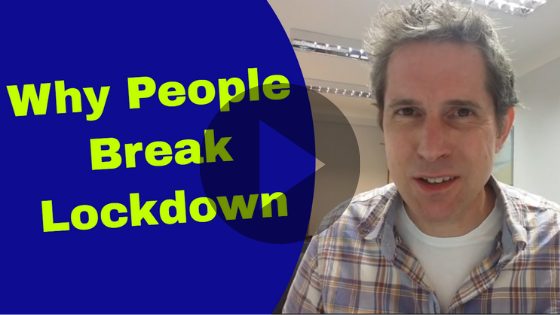Required
Why Do Some People Break Lockdown Rules?
Why Do Some People Break Lockdown Rules?
The past weekend has seen some of the hottest temperatures of the year here in England. And with that, hundreds of people have headed to the beach and other open areas to enjoy the sunshine. As I write this, gatherings have only today been relaxed a bit so that you can meet up to five other people outdoors, as long as you maintain social distancing.
Yet throughout lockdown there has been case after case of people not following the lockdown rules and guidance. From high profile people who get ‘caught out’ publicly to people you may have seen in your own neighbourhood. Even the figures on the daily briefing slides suggest that about 20% of people have admitted going out other than for allowed reasons and where I live I would say that the figure is much higher. From street parties to visiting family, and despite the number of deaths approaching forty thousand, some people have seemingly put their own needs above the interests of us all.
So why is that? Why do some people break lockdown rules?
The Optimism Bias
Now, when I talk about people breaching the lockdown rules, it’s worth noting that there may be some people who simply misunderstood the rules and made an honest mistake. There may be those who, despite appearing to breach the rules, actually didn’t because they were key workers or collecting food or medicine for someone vulnerable.
Some people may have broken the rules having seen high profile people do likewise and there are those who will have simply rebelled against being told what to do.
Yet there are those who knew the rules, knew why the rules were there yet continued to break them anyone. Perhaps they had people from another household over or decided to hold a street party with sporadic social distancing, for example.
In this video, I talk about a psychological reason that people break the rules:
I also covered some of the research behind this psychological bias in this article: What Can We Learn From The Covid-19 Pandemic?
Psychology suggests that people who break the lockdown rules do so because of the ‘optimism bias’ which means that they think that catching covid-19 won’t happen to them. This bias means that we overestimate the likelihood of positive events in the future and underestimate the likelihood of negative events, although with mental health issues like anxiety and depression this bias tends not to occur.
“Humans, however, exhibit a pervasive and surprising bias: when it comes to predicting what will happen to us tomorrow, next week, or fifty years from now, we overestimate the likelihood of positive events, and underestimate the likelihood of negative events” (Sharot, 2011. The optimism bias).
In the early stages of the pandemic, Kuper-Smith et al (Optimistic beliefs about the personal impact of COVID-19, 2020) found that “individuals show an optimism bias: they estimate the probability of getting infected with the virus, and of infecting others if infected themselves as lower for themselves than for someone similar to them.”
And Wise et al (Changes in risk perception and protective behavior during the first week of the COVID-19 pandemic in the United States, 2020) found that “However, they underestimated their personal risk of infection relative to the average person in the country. We found that engagement in social distancing and handwashing was most strongly predicted by the perceived likelihood of personally being infected, rather than likelihood of transmission or severity of potential transmitted infections.”
Once gain the optimism bias means that people underestimate the likelihood that they will contract covid-19 and that thinking bias can then lead to less compliance with preventative measures such as social distancing.
All of which suggests that one reason that people do not follow the lockdown rules is because they underestimate the likelihood they will get covid-19 or that they will pass it on.
The optimism bias is one of a number of instances where our thinking can be off and our brains are just wrong. And that means we should all pay attention to our predictions and better understand how our thinking can be erroneous so that we can better plan and make better decisions to protect ourselves and others.
Stay safe,
Dan Regan
Hypnotherapy in Ely & Newmarket
Need some help to improve your mental health and to feel better? Book your Complimentary Hypnotherapy Strategy Session with Dan now: Appointments
Find out what other people have said after their hypnotherapy sessions with Dan: Hypnotherapy Testimonials
And check out these powerful hypnosis downloads that can start helping you right away: Hypnosis Downloads
References:
Kuper-Smith, B.J., Doppelhofer, L.M., Oganian, Y., Rosenblau, G. and Korn, C., 2020. Optimistic beliefs about the personal impact of COVID-19.
Sharot, T., 2011. The optimism bias. Current biology, 21(23), pp.R941-R945.
Wise, T., Zbozinek, T.D., Michelini, G. and Hagan, C.C., 2020. Changes in risk perception and protective behavior during the first week of the COVID-19 pandemic in the United States.
Get Your Copy Right Now…
Subscribe to Dan’s Digest filled with tips, strategies and techniques and get instant access to your free rapid relaxation hypnosis audio track.
Enjoy feeling and being more mentally calm and physically relaxed right now:





0 Comments